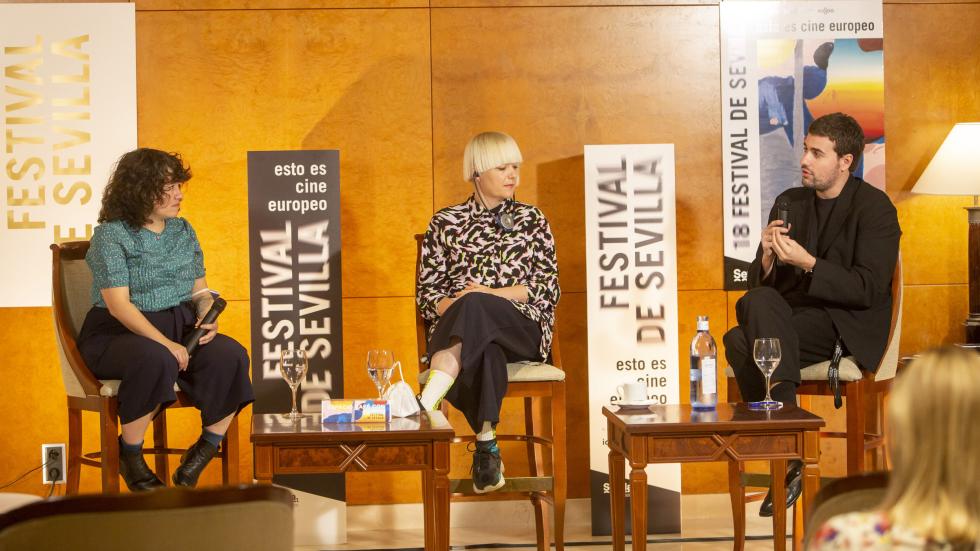Marta Popivoda, Álvaro F. Pulpeiro, Julian Radlmaier, Max Eriksson and Ismaël met at the fifth 'Coffee with...'
Seville, 10 November 2021 - The fifth day of "A Coffee with..." brought together on Wednesday the directors Marta Popivoda, Paisajes de resistencia; Álvaro F. Pulpeiro, Un cielo tan turbio; Julian Radlmaier, Bloodsuckers; Max Eriksson, The scars of Ali Boulala and Ismaël, Black Medusa. The meeting was divided into two blocks. On the one hand, the first two films mentioned above are linked by a story of resistance that situates the spectator in two such extreme places as the Auschwitz-Birkenau extermination camp during the Second World War and the Venezuelan border. The following space, which included the titles Bloodsuckers, The scars of Ali Boulala and Black Medusa, focused on contemporary uprooting: the margins of society.
Landscapes of Resistance
Marta Popivoda's film Landscapes of Resistance, which screened on Tuesday in the New Waves Non-Fiction section, tells the story of Sonja Vujanović, one of Serbia's first female partisans. This national heroine, now 97 years old, resisted several marches across Europe and the humiliation and torture of two concentration camps. "Getting to know Sonja has been an act of learning through the transmission of knowledge between generations that has helped us to recognise contemporary fascism. What she experienced, we do differently, but the principles are the same", explained the director.
The screenplay is co-written with Ana Vujanović, her partner and granddaughter of the protagonist. Through her, he delves into the family history. "I realised that she is a very powerful storyteller, able to create images in our minds. We wanted to give space to those images. We researched to find the specific places where the events took place," says Popivoda. Figures also play an important role in the film, so the landscapes may be the same, but depending on the point of view, it would tell one story or another.
On the other side of the world, set on the different borders of Venezuela and in a contemporary era, is So Foul a Sky, the second feature film by Álvaro F. Pulpeiro, which forms part of the Endless Revolutions section. Its story is set on that blurred line that divides some countries and is governed by the military, drug traffickers, smugglers and dream seekers. The filmmaker has described these enclaves as "dark spaces, an anarchy full of life".
Although Venezuela is one of the world's largest oil producers, the petrol shortage crisis has opened the door to a vast illegal market. Pulpeiro lived with these traders and discovered that "the things we didn't have in common brought us closer together in the end". The film, explains the director, moves away from that moment of arrogance that any documentary filmmaker might have fallen into: "I didn't go in with a camera and a desire to make a film, but to create an encounter between me and the person in front of me. I was looking for knowledge. Sometimes the most banal things begin to create vulnerability between the two of us," assured the filmmaker.
Social marginalisation: living on the edges
In the second block, director Julian Radlmaier presented Bloodsuckers, a Marxist vampire comedy that deals with the relationships between different social classes. The filmmaker explained that, when he was young, he was part of a group that read a text about the economist Karl Marx: "He used a lot of vampire allegories and the characters in my film begin to wonder whether this is really a metaphor or whether the film is really talking about vampires, and as a result of this misunderstanding, this fiction arises", he explained.
The scars of Ali Boulala, the feature debut of fashion photographer and short film director Max Eriksson, tells the story of one of the skateboarding legends of the 90s. "The characters we meet are on the margins of society and when people see Ali they realise that he is like a rock star". The filmmaker explained that he wanted to go a little further than this image and portray the skateboard collective: "Instead of making this documentary 'in a big way', I wanted to portray this community and see the life they had", he pointed out.
The former athlete and protagonist of the film, Ali Boulala, also took part in the meeting. He considers himself a normal person, which is why he was surprised to see himself portrayed in the images. "When I started skateboarding, it was something different. We didn't want to be like everyone else. The film shows what that part and the subculture was like at that time", he explained. To give a sense of realism, Eriksson shot hand-held film, with the idea that the images filmed by the skateboarders that are old don't clash with the new ones. "When I see the finished product, I don't think about the different eras, there are images from the 90s and recent ones that blend together quite well," said Boulala.
Finally, director and visual artist Ismaël spoke about Black Medusa, co-directed by Youssef Chebbi. The myth of Medusa, who according to Greek mythology turned anyone who looked at her into stone, is brought to modern times. The film tells the story of Nada, a young Tunisian woman who works in an office by day and seduces men at night in order to destroy them. "The main idea was to make a film outside the norms of contemporary production. We wrote the script in two weeks and somehow tried to make a film far from the usual."







